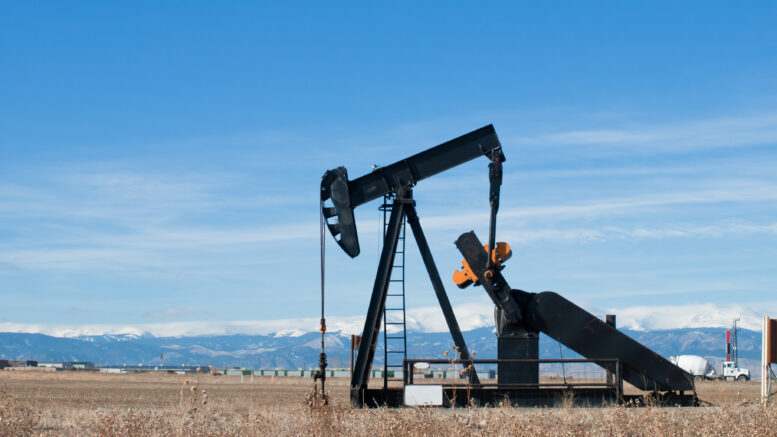A bill that is expected to be introduced this week would raise the permitting requirements for all new oil and gas operations in Colorado — a process that supporters cite as needed to reduce ozone pollution but that energy-industry leaders argue will bring a standstill to new well development along the northern Front Range.
The proposal, which will be sponsored by Democratic Reps. Jennifer Bacon of Denver and Jenny Willford of Northglenn, comes roughly one month after Gov. Jared Polis issued a directive to leaders of two agencies to develop rules by which producers must cut nitrogen oxides 30% by 2025 and 50% by 2030. And it comes as a region from the Denver area north through Weld County sits under new classification by the U.S. Environmental Protection Agency as a severe violator of ozone standards, a nonattainment designation that will require gasoline stations to sell more expensive clean fuel in summer months and more businesses to undergo environmental regulations.
The wide-ranging bill aims most of its new rules at oil and gas producers.
What’s in the bill
It requires, for example, that even projects that now are considered minor sources of pollutions, such as new oil and gas wells, must undergo modeling from the Colorado Air Quality Control Commission to see if they will exceed ambient air-quality standards, including modeling on preproduction emissions during ozone season that aren’t now required to be modeled. The results of such modeling — which, under the bill, could combine new wells with any wells owned by the same company in a two-square-mile area — must be considered in deciding whether permits can be issued.
In a draft version of the bill given to The Sum & Substance, the proposal also requires the AQCC and the Colorado Oil and Gas Conservation Commission to investigate any complaints they receive from residents or groups that are not clearly frivolous or trivial and to determine whether a violation has occurred within 90 days. It also allows complainants to seek a hearing before the AQCC if an investigation determines that no violation occurred, and it requires courts to award complainants’ attorneys’ fees and other costs if the court deems them appropriate.
Finally, the bill stretches the state’s regulatory abilities in several ways. It allows the AQCC to develop regulations on indirect sources such as warehouses and shopping malls — an area the state said last year that it was beginning to consider regulating — that are more stringent than federal rules, and it creates new electrification requirements for stationary engines used in oil and gas operations.
A needed look at minor pollution sources?
Danny Katz, director of the Colorado Public Interest Research Group (CoPIRG), said that after four years of efforts by the state to reduce ozone pollution from existing oil and gas wells, the bill is important because it seeks to limit ozone pollution coming from the roughly 1,000 new sources of minor pollution that get permitted every year. It also requires the AQCC and COGCC to coordinate permitting actions more to ensure that a holistic approach to pollution reduction.
“It feels a lot like we’re trying to bring down pollution on one hand and we’re adding new sources on the other hand,” said Katz, whose group was not involved in writing the bill but has been monitoring its development closely. “We’ve got to turn off the spigot.”
But Dan Haley, president/CEO of the Colorado Oil & Gas Association, said the bill will effectively eliminate any new oil and gas developments — and, in doing so, likely would increase ozone pollution in this state.
COGCC and the Colorado Department of Public Health and Environment, which oversees the AQCC, have been mired in a permitting backlog that is holding back the ability of companies to drill new wells using cleaner technology, and the additional permitting and investigatory requirements in this bill could create a years-long morass. That in turn would cause Colorado to transport in oil and gas from outside the state and country and nullify any reductions on ozone pollution or greenhouse-gas emissions that Polis has been seeking through the directives like the one he issued last month, Haley said.
Unintended consequences?
“This is not a serious attempt to lower ozone; it’s a backdoor ban on oil and gas,” Haley said in a statement. “Our industry is developing some of the cleanest energy molecules on the planet. But this bill, written by activist groups, would drive up energy prices on Coloradans and bring much of the broader economy to a grinding halt.”
In addition to the expected fight with the oil and gas industry, the bill could create fights between supporters and Polis, who signed 55 laws over his first four years in office adding environmental regulations to the energy industry and other sectors. A spokesman for the Democratic governor told the Denver Post on Monday that the bill would create “major unintended consequences” that could hurt the state’s economy.
The bill comes also as local governments are grappling over the question of which regulations are appropriate and which are overly burdensome on the energy sector at a time when rising natural-gas prices already have led legislators to investigate potential solutions in that area. The Denver Business Journal noted Tuesday that Arapahoe County Commission members rejected a proposed moratorium on oil-and-gas-well permit applications even as commissioners are looking at ways to update local laws in order to increase air quality.
